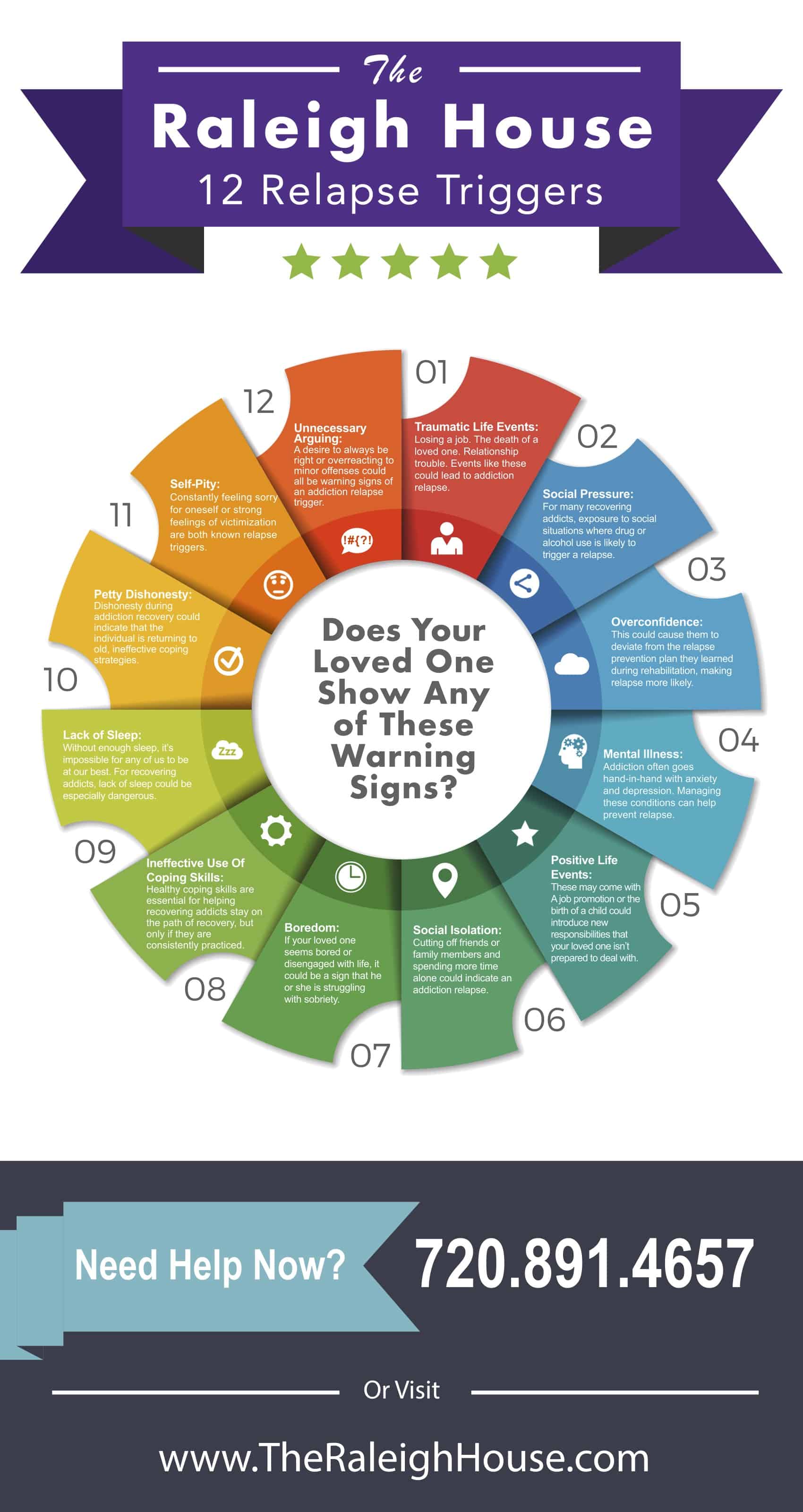
Does Your Loved One Show Any of These Addiction Relapse Triggers?
1. Traumatic Life Events: During treatment at The Raleigh House, your loved one will learn to use healthy coping skills to deal with life’s ups and downs. Adhering to these new techniques – especially when times are tough – may take a level of discipline that your loved one has yet to achieve. Like any new skill, practice is essential for improvement.
2. Social Isolation: If you notice your loved one spending more time alone or shutting down communications with friends or other family members, this could lead to feelings of loneliness. The longer a recovering addict remains in this state of social isolation, the greater the chances of an eventual relapse. Get tips for preventing social isolation and addiction relapse.
3. Social Pressure: For many recovering addicts, exposure to social situations where drug or alcohol use is likely to occur may trigger a relapse. If your loved one is frequenting places or people associated with substance abuse, this could be a warning sign that relapse is imminent.
4. Overconfidence: Recovering addicts who exhibit extreme confidence in their ability to abstain from substance abuse may eventually become complacent about their ongoing recovery. This could cause them to deviate from the relapse prevention plan they learned during rehabilitation, making relapse more likely.
5. Boredom: Preventing boredom is important because we know that some people use chemicals to add excitement to their lives. Engaging in fun activities or hobbies is a healthy way for recovering addicts to fill their time in the absence of drugs or alcohol. Get tips for coping with boredom after addiction.
6. Mental Illness: At The Raleigh House, we know that addiction often goes hand-in-hand with other mental illnesses like anxiety and depression. This is why our rehab program addresses the potential co-occurring conditions that could be contributing to your loved one’s struggle with addiction. Changes in mental health after treatment could also trigger a relapse.
7. Positive Life Events: Even causes for happiness could potentially trigger a relapse if the recovering addict feels justified in using alcohol or drugs to celebrate. And, if the positive event comes with new responsibilities, as in the birth of a child or a job promotion, your loved one may feel increased stress or pressure – both of which are known addiction relapse triggers.
8. Ineffective Coping Skills: Addiction recovery is an ongoing process, not a one-time event. As your loved one progresses through the stages of life, he or she may start to fall back into ineffective or unhealthy coping mechanisms. Abandoning the relapse prevention plan is a known relapse trigger.
9. Lack of Sleep: Without enough sleep, it’s impossible for any of us to be at our best. For recovering addicts, lack of sleep could be especially dangerous. A study published in the Journal of Addiction Medicine found that people in the early stages of alcohol addiction recovery who were treated for sleep disturbances like insomnia actually decreased their odds of relapse. Get tips for sleeping after addiction.
10. Petty Dishonesty: Does your loved one tell unnecessary lies or half-truths about seemingly inconsequential things? Dishonesty during addiction recovery could be an indication that the recovering addict is returning to old, ineffective coping strategies.
11. Self-Pity: Constantly feeling sorry for oneself or strong feelings of victimization could trigger a relapse. Does your loved one accept responsibility for personal choices or place blame on others? Recovering addicts who are taking responsibility for their lives and making better decisions increase their chances of long term recovery. This may be something that will need to be worked on throughout recovery.
12. Unnecessary Arguing: Some recovering addicts will attempt to give themselves a reason to abuse drugs or alcohol again. This may be a conscious or unconscious attempt. Needless arguing over trivial matters, a desire to always be right or overreacting to minor transgressions could all be warning signs of an addiction relapse trigger. Get tips for managing anger during recovery.
Relapse is Avoidable if You Know the Triggers
There are many potential triggers that could cause a recovering addict to begin using again. At The Raleigh House, a substance abuse program in Denver, we help our residents maintain sobriety after treatment by developing personalized relapse prevention plans. Through understanding how the relapse process works and giving residents the tools they need to identify their triggers, we lay the ground work for a life-long recovery. If someone you love is struggling with addiction, or if you notice any of the triggers discussed here, don’t wait. Contact The Raleigh House today.
